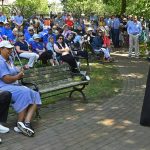LYNN – Retired Item reporter Tom Dalton started writing about Frederick Douglass in 1990 to inform readers of the prolific abolitionist’s connection to Lynn. Douglass resided in Lynn from 1841-1848, and wrote his influential autobiography “The Narrative Life of Frederick Douglass” in the city.
When he retired in 2014, Dalton noticed major celebrations of Douglass’s 200th birthday were being planned in Washington, D.C., Rochester, N.Y. and other places. Therefore, he decided to write “Frederick Douglass: The Lynn Years” to provide an accurate record with Douglass’ years in Lynn.
“When Frederick Douglass came to Lynn three years after escaping from slavery, he was a man on a mission to free the country’s four million enslaved persons. He could have remained in New Bedford under his assumed name of Frederick Douglass — his real name was Frederick Bailey — and lived a quiet life in a largely Black community. Instead, he came to Lynn and traveled the country speaking to crowds, risking recapture and a return to slavery if someone recognized him,” Dalton said.
Dalton added, “When people started to doubt he had ever been a slave because he spoke so eloquently and quoted from Shakespeare, Dickens and other writers, he came home to Lynn to write his first autobiography. His friends told him he was crazy to tell his true story, but he insisted on using his real name, telling people he lived in Lynn, and naming slaveholders who committed crimes. The book was either a reckless act of madness, or one of the most heroic books ever written.”
Dalton had a clear message in mind while writing “Frederick Douglass: The Lynn Years.”
“I hope his real legacy will be that more people, especially students in the Lynn schools, will read the ‘Narrative of the Life of Frederick Douglass’ and realize the difference a person can make by courageously standing up for the truth and what is right no matter the risk,” he said.
He also highlighted a highly significant aspect of Douglass’ impact that has been often overlooked by previous historians.
“I hope that Lynn residents will think about Anna Douglass, his wife of 44 years who helped him escape, raised their five children almost on her own, supported her husband through all his struggles, turned her house into a station on the underground railroad, and yet has been forgotten by history,” Dalton said.
On Tuesday, Dalton sat down with Douglass’ great-great-great grandson Kenneth B. Morris Jr. at the Lynn Museum and Arts to discuss Douglass’ legacy in Lynn. There, both Dalton and Morris Jr. proposed that Frederick Douglass Park be renamed to The Frederick and Anna Douglass Park.



